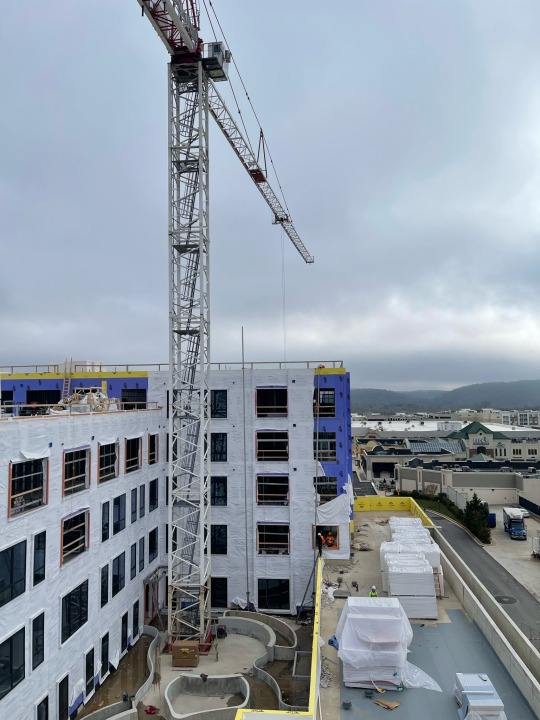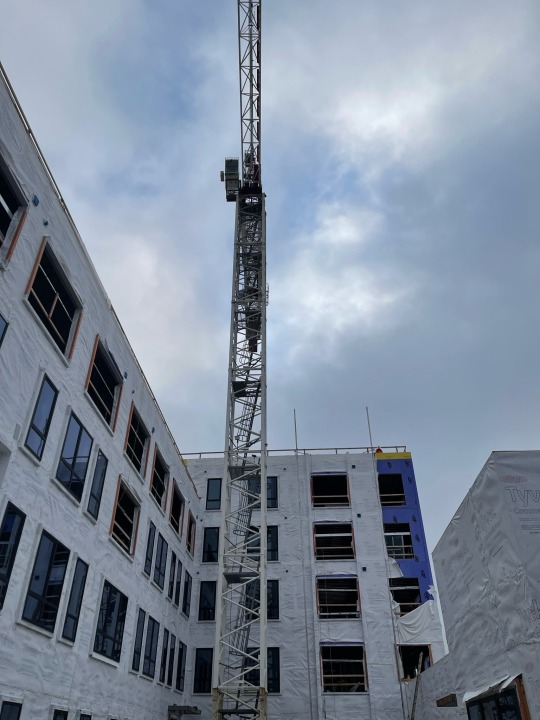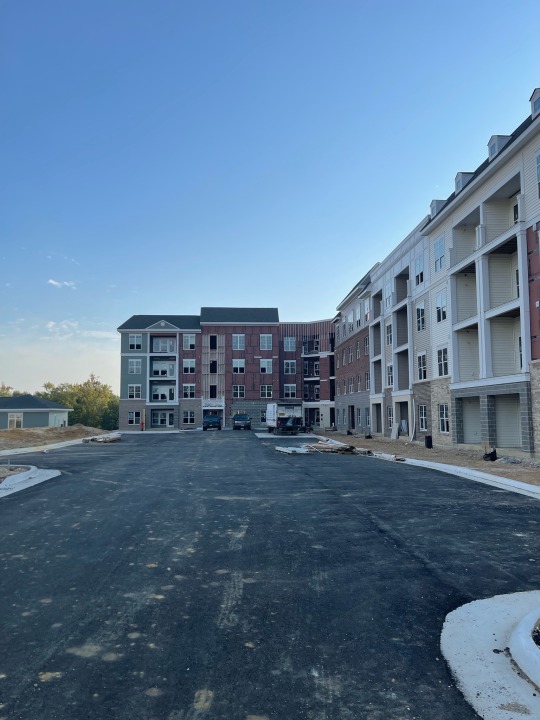#IT Solutions for Real Estate Industry
Explore tagged Tumblr posts
Text
🏡Jai Maa Bhawani Sonand Construction - Shaping Patna's Architectural Landscape♻️

🚧In an era where sustainability is paramount, Jai Maa Bhawani Sonand Construction is committed to eco-friendly building practices. The company integrates sustainable design principles and green building techniques into its projects, ensuring minimal environmental impact and promoting energy efficiency.
📲CONTACT US :- +91-9729024415
⛳OFFICE ADDRESS :- Kachauri Gali, Near Narayani Kanya School, Patna City
Construction Company Patna Builders Residential Construction Commercial Construction Quality Construction Sustainable Building Innovative Construction Trusted Builders Building Solutions Construction Projects Modern Architecture Building Excellence Real Estate Development Patna Construction Industry Construction Services Project Management Construction Expertise Infrastructure Development Architectural Design Building Patna
JaiMaaBhawaniSonand #PatnaConstruction #BuildingPatna #ConstructionExcellence #InnovativeBuilding #QualityConstruction #TrustedBuilders #PatnaRealEstate #FutureOfConstruction #SustainableBuilding #ArchitecturalInnovation #ResidentialConstruction #CommercialConstruction #ConstructionLeaders #BuildingDreams #ModernConstruction #ConstructionStandards #BuildingTrust #CraftingLandmarks #ConstructionPartner
#Construction Company#Patna Builders#Residential Construction#Commercial Construction#Quality Construction#Sustainable Building#Innovative Construction#Trusted Builders#Building Solutions#Construction Projects#Modern Architecture#Building Excellence#Real Estate Development#Patna Construction Industry#Construction Services#Project Management#Construction Expertise#Infrastructure Development#Architectural Design Building Patna
1 note
·
View note
Text
How VR And AR Are Reshaping The Real Estate Industry

In the rapidly evolving landscape of technology, the real estate sector has been at the forefront of adopting cutting-edge innovations to optimise processes and enhance customer experiences. Among the most impactful advancements are virtual reality (VR) and augmented reality (AR), which have disrupted traditional real estate practices by offering immersive and interactive solutions. In this blog, we delve into the technical aspects of how virtual and augmented reality in the real estate industry are shaping the industry.
Understanding VR and AR
Virtual Reality (VR) is a technology that creates a simulated, computer-generated environment where users can immerse, interact and navigate through the digital space, creating a highly engaging experience. Augmented Reality (AR), on the other hand, enhances the real-world environment by overlaying digital content, such as images, videos, or 3D models, onto the user's view of the physical world. Unlike VR, AR does not replace the real world but augments it with additional information or interactive elements. Property tech companies are trying to capitalize on this to bring about advances in the real estate industry.
Following are the different ways in which AR & VR is transforming the real estate industry:
Immersive virtual property tours: Virtual Reality in real estate has revolutionised the way a property is viewed and experienced. It enables potential buyers to participate in immersive virtual property tours. Virtual tours provide an incredibly realistic experience, encouraging prospective buyers to navigate through different rooms, assess property layouts, and gauge spatial dimensions. This is not only time and travel-efficient for the buyers, but it also streamlines the property search process eradicating the middlemen and unnecessary procedures leading to higher customer satisfaction.
Augmented visualisation and personalisation: Augmented Reality (AR) in the real estate industry has empowered real estate developers and agents to enrich property showcases through augmented visualisation and personalisation. VR and AR technologies equip real estate developers to showcase properties in innovative ways, allowing buyers to customise interior designs, room layouts, and even furniture arrangements. This level of personalisation enhances buyers with a comprehensive understanding of the potential of a property, thereby increasing their propensity to make a purchase decision.
Remote Collaboration and Multi-User Interaction The integration of VR and AR in real estate has facilitated remote collaboration and multi-user interaction. Geographically dispersed stakeholders, including buyers, agents, and developers, can now engage in virtual meetings and property walkthroughs in real time. This capability has broadened the market for real estate developers, attracting a global pool of potential buyers and investors. As a result, properties can be marketed to a wider audience, increasing the likelihood of sale.
Accelerating the Sales Cycle VR and AR are revolutionising the real estate sales cycle by expediting the decision-making process. By bolstering prospective buyers with in-depth virtual property experiences, these technologies accelerate efficient evaluations and comparisons. Consequently, buyers can make more informed decisions, shortening the overall sales cycle. The benefits are two-fold, as developers experience reduced holding costs, while buyers enjoy faster property acquisition. Additionally, AR-powered smart contracts and blockchain integration hold the potential to streamline the purchase process further, eliminating intermediaries and enhancing transaction security
Off-Plan Property Visualisation and Pre-Sale Marketing: For developers marketing off-plan properties, VR and AR serve as powerful tools to showcase unfinished projects to potential buyers. Through realistic virtual representations of the completed project, buyers can gain insight into the final appearance, layouts, and surroundings. They can visualize the property's appearance, understand its spatial layout, and experience different views. This level of visualization helps developers generate interest and secure early sales, even before the project is completed.
Empowering Real Estate Agents with Enhanced Data Insights Virtual and augmented reality technologies empower real estate agents by providing them with access to enhanced data insights and analytics. By analyzing user behaviour within VR/AR environments, agents can gain valuable information on buyer preferences, interactions, and engagement patterns. This data-driven approach enables personalized and targeted marketing strategies, resulting in more effective lead generation and higher conversion rates. Moreover, AI-driven algorithms can identify buyer trends, predict demand patterns, and assist agents in providing personalized property recommendations to potential buyers.
Conclusion: Virtual and augmented reality have ushered in a new era for the real estate industry, offering immersive experiences and transforming traditional processes. From virtual property tours to personalized visualizations, these technologies have streamlined the way properties are bought and sold. They have empowered buyers with greater control and understanding of their potential investment, while also benefiting real estate developers and agents with increased efficiency and market reach. As technology continues to evolve, we can expect virtual and augmented reality to play an even more significant role in building the future of the real estate market, bringing buyers and sellers closer than ever before. Explore the future of real estate with Aurum Proptech! Immerse yourself in cutting-edge virtual and augmented reality experiences that revolutionize property transactions. From virtual tours to personalized visualizations, we're shaping the future of real estate. Don't miss out—visit our website now: Aurum Proptech. Your next property adventure awaits!
2 notes
·
View notes
Text
Why Resort Owners Should Consider Powerkavach or Equipower for Electrical Safety
#440V protection#Bengaluru Electrical Solutions#Electrical Fire Safety#Electrical Safety#electricity#Equipower#Equipower Installation#Farmhouse Voltage Protection#Guest Satisfaction#home#Home Appliance Safety#Home Electrical Protection#home-improvement#Hotel Power Backup#Industrial Electrical Protection#mainline voltage protector#Office Power Protection#Overhead Wire Issues#Power Surge Protection#powerkavach#Prevent Electrical Fires#real-estate#Renewable energy#Resort Power Protection#Sanjivani Farm & Resort#Short Circuit Prevention#Solar System Protection#surge protection#technology#Transformer Failure Protection
0 notes
Text
Future-Ready Warehousing & Logistics Parks by RMZ NXT | Smart Industrial Infrastructure in India
Discover RMZ NXT – RMZ Corp’s next-generation platform for industrial and logistics infrastructure in India. Built for efficiency, scale, and sustainability, RMZ NXT offers Grade-A warehousing parks, last-mile delivery hubs, and industrial facilities in prime logistics corridors. Ideal for e-commerce, FMCG, retail, and 3PL businesses, RMZ NXT delivers tech-enabled, strategically located spaces with built-to-suit capabilities and future-ready design.
Explore more: https://www.rmz.com/real-estate#rmz-nxt
#industrial parks India#warehousing solutions#logistics hubs India#smart#sustainable warehousing India#Grade-A warehouses#RMZ industrial real estate#warehouse leasing India
0 notes
Text
Revolutionize Your Enterprise with Simulanis VR & AR
The future of business is immersive, interactive, and driven by technology. Enterprises that embrace Virtual Reality (VR) and Augmented Reality (AR) are unlocking new levels of efficiency, engagement, and innovation. At Simulanis, we are revolutionizing industries with cutting-edge VR and AR solutions that transform workforce training, customer experiences, and operational workflows.

Why VR & AR Are Essential for Enterprise Growth?
🔹 Next-Generation Employee Training Traditional training methods are no longer enough. Simulanis VR training solutions create realistic, hands-on virtual simulations, allowing employees to practice in a risk-free environment. AR-assisted learning further enhances training by providing real-time digital overlays and interactive guidance.
🔹 Enhanced Customer Engagement & Product Visualization Enterprises can showcase products and services in 3D, offering customers an immersive and interactive buying experience. VR-powered virtual showrooms and AR product visualization tools help businesses boost sales and brand loyalty.
🔹 Operational Efficiency & Safety Improvements From industrial safety training to real-time AR-powered remote assistance, immersive technologies help enterprises reduce risks, improve accuracy, and enhance productivity. AR smart glasses and VR simulations empower teams to perform complex tasks with greater precision.
🔹 Immersive Collaboration & Remote Work Solutions With VR-powered virtual workspaces, businesses can conduct meetings, training sessions, and brainstorming workshops in a realistic, collaborative digital environment. This is the future of hybrid work models and global enterprise connectivity.
🔹 Seamless Integration with the Metaverse The Metaverse is redefining business interaction, allowing enterprises to build virtual spaces, host digital events, and create next-level customer experiences. Simulanis provides tailored Metaverse solutions that help businesses stand out in the digital landscape.
Industries Benefiting from Simulanis VR & AR Solutions
✅ Manufacturing & Industrial Training – VR-based process training, equipment simulations, and AR maintenance guides. ✅ Healthcare & Medical Training – Surgical simulations, medical procedures training, and AR-assisted diagnostics. ✅ Retail & E-Commerce – Virtual try-ons, 3D product showcases, and interactive shopping experiences. ✅ Education & Corporate Learning – Engaging VR classrooms, AR-based learning modules, and enterprise e-learning solutions. ✅ Real Estate & Architecture – Immersive virtual property tours, 3D architectural visualizations, and interactive design planning. ✅ Automotive & Engineering – VR for vehicle prototyping, driver training, and AR-powered repair assistance.
Why Choose Simulanis?
At Simulanis, we are pioneers in VR, AR, and Metaverse technology, helping businesses unlock the full potential of immersive solutions. Our expertise in Extended Reality (XR) solutions ensures that enterprises can streamline operations, enhance customer engagement, and train employees more effectively.
🚀 The future of enterprise innovation starts now! 🚀
📩 Get in touch with Simulanis today and explore how VR & AR can transform your business!
Visit Website: simulanis.com
#Virtual Reality (VR)#Augmented Reality (AR)#Mixed Reality (MR)#Metaverse Solutions#Extended Reality (XR)#Enterprise VR Solutions#AR for Business#Immersive Technology#Future of Work#Digital Transformation#VR Training Programs#AR Training Modules#Industrial VR Training#Corporate Learning with XR#3D Virtual Simulations#AR Product Visualization#Workforce Training Solutions#Metaverse for Enterprises#Remote Work with VR#AI-Powered AR/VR#Smart Manufacturing with XR#VR for Employee Development#Augmented Reality for Retail#Virtual Showrooms#AR Maintenance & Support#VR in Healthcare & Medical Training#Immersive Learning Solutions#AR/VR for Real Estate#Enterprise Innovation with XR
0 notes
Text
Warehouses are the unsung heroes of business growth. In this blog, you will learn the best strategies for increasing warehouse space that will turn a crowded chaos into seamless storage.
#industrial plot for sale in kolkata#industrial land for sale in kolkata#Industrial Properties For Sale#Industrial Real Estate#Commercial Properties Kolkata#Commercial Properties for Sale#E-Commerce Warehouse Solution
0 notes
Text
#data labeling#Smart Data Solutions#PropTech Industry#Data Solutions in PropTech#AI in Real Estate Transactions#Logistics and Supply Chain in Real Estate
0 notes
Text

Advanced PropTech for Real Estate Transform with Mobiloitte
#Real Estate#Real Estate Software Development Company#Real Estate Software Development#IT Solutions for Real Estate#IT Solutions for Real Estate Industry#Real Estate Software
0 notes
Text



Construction Industry Braces for Tariffs: How Developers Are Adapting to Uncertainty
The construction and real estate development industries are navigating a perfect storm of potential cost increases, labor shortages, and policy-driven uncertainties. The latest concerns center around proposed tariffs on goods from Mexico and Canada, combined with immigration policies that could disrupt labor availability. These challenges are pushing developers to rethink their strategies in real time.
Material Costs: The Tariff Factor
Developers are on edge as the U.S. government considers imposing a 25% tariff on key construction materials like lumber, steel, and drywall. Suburban multifamily developments, which often rely heavily on Canadian lumber, are particularly vulnerable. Although material prices are well below their pandemic-era peaks, these new tariffs could tighten profit margins for new projects.
What It Means for Developers
• Higher Material Costs: A 25% tariff could significantly inflate budgets for projects already in the pipeline.
• Strategic Stockpiling: Builders are preemptively stockpiling materials, driving demand for industrial outdoor storage (IOS) spaces—a boon for investors in the IOS sector.
• Supply Chain Pressures: The surge in demand for storage is adding new stress to an already tight supply chain, creating logistical hurdles for developers.
Labor Shortages: A Growing Concern
Undocumented workers make up about 13% of the construction workforce nationwide, with higher concentrations in key markets like Texas, Florida, and California. Proposed immigration policies could lead to deportations, exacerbating labor shortages in an industry already stretched thin.
Who Will Be Impacted the Most?
• Small Projects: These often rely heavily on undocumented labor, putting them at the highest risk of delays and cost overruns.
• Unionized Developments: Larger, unionized projects may be less immediately affected, thanks to a more stable labor force.
The Economic Wildcard
The combination of tariffs, labor disruptions, and recent corporate tax cuts has economists warning of potential inflationary pressures. Rising costs for construction loans and bridge financing could ripple across the industry. However, some experts believe the Federal Reserve may act faster than in previous cycles to curb inflation, potentially mitigating the long-term impact.
Key Questions to Consider
• How will rising costs affect housing affordability?
• Could these challenges slow down the development of suburban multifamily projects?
• What steps should developers take now to hedge against these risks?
The Big Picture
In response to looming tariffs, developers are adjusting their strategies by stockpiling materials and rethinking project timelines. The ripple effects extend beyond construction sites to include industrial storage markets and broader economic trends.
For real estate developers and investors, this is a critical moment to stay informed and agile. Collaborating with supply chain experts, exploring alternative materials, and securing financing with built-in contingencies are just a few ways to stay ahead in this evolving landscape.
Let’s Discuss
What strategies are you considering to navigate these challenges? Share your thoughts and insights below—we’d love to hear how you’re adapting in these uncertain times.



#construction#supply chain management#supply chain optimization#supply chain solutions#commercial and industrial sectors#self storage#real estate#investment#danielkaufmanrealestate#economy#real estate investing#daniel kaufman#housing#homes#politics#donald trump#economics
0 notes
Text
How do I get started with app development?
Getting started with app development can be an exciting journey! Begin by identifying the type of app you want to create—mobile, web, or desktop. Next, choose a platform (iOS, Android, or both) and learn programming languages like Swift for iOS or Java/Kotlin for Android.
Visit us - https://qr.ae/p2QSCx
#Manufacturing#Industry 4.0#Supply Chain#Digital Solutions#Real Estate#Next-gen digital transformation
0 notes
Text
Join Jai Maa Bhawani Sonand Construction For Residential and Commercial Construction in Patna
http://www.jaimaabhawanisonandconstruction.com

"Whether you're building your dream home or setting up a new commercial space, Jai Maa Bhawani Sonand Construction offers reliable construction services in Patna. Our expertise spans residential, commercial, and industrial projects, delivering on time and within budget."
📲CONTACT US :- +91-9729024415
⛳OFFICE ADDRESS :- Kachauri Gali, Near Narayani Kanya School, Patna City
#{ Construction Company#Patna Builders#Residential Construction#Commercial Construction#Quality Construction#Sustainable Building#Innovative Construction#Trusted Builders#Building Solutions#Construction Projects#Modern Architecture#Building Excellence#Real Estate Development#Patna Construction Industry#Construction Services#Project Management#Construction Expertise#Infrastructure Development#Architectural Design Building Patna }#JaiMaaBhawaniSonand#PatnaConstruction#BuildingPatna#Construction
0 notes
Text
4th Quarter Technologies (4QT), a leading developer of comprehensive software solutions, brings its deep understanding and expertise in the real estate sector to provide a web-based ERP software that addresses the complexities of real estate operations. Real estate developers, property managers, and brokers can confidently use this software to streamline business operations, boost productivity, and enhance efficiency.
4QT Real Estate ERP software stands out with its unique integration of various aspects of real estate management, including inventory tracking, project planning, financial reporting, and customer relationship management. This integration allows companies to manage their entire workflow from a single platform, impressively eliminating the need for multiple fragmented systems and ensuring a streamlined and efficient process.
4QT's unwavering commitment to innovation and customer satisfaction has not only positioned it as a leader in the Indian real estate software market but also reassured businesses of its dedication to simplifying property management and ensuring regulatory compliance. This makes 4QT the top choice for businesses seeking reliable and scalable software.
By partnering with 4QT, companies can gain a significant competitive advantage in the Indian real estate market. Our software, designed specifically for this market, helps organizations stay ahead of the curve and fulfill the industry's constantly evolving requirements.
#real estate erp software#erp for real estate#real estate erp india#erp in real estate#erp software for real estate#real estate erp solutions#erp software for real estate company#erp real estate#erp software for real estate in india#erp for real estate industry#real estate erp systems#real estate sales#real estate leads#crm analytics#erp analytics#real estate CRM analytics#4qt.com
0 notes
Text
32A 3ph Equipower: Reliable 440V Protection for a Home in Attibele, Near Bengaluru
#440V protection#Bengaluru Electrical Solutions#Electrical Fire Safety#Electrical Safety#electricity#Equipower#Equipower Installation#Farmhouse Voltage Protection#Guest Satisfaction#home#Home Appliance Safety#Home Electrical Protection#home-improvement#Hotel Power Backup#Industrial Electrical Protection#mainline voltage protector#Office Power Protection#Overhead Wire Issues#Power Surge Protection#powerkavach#Prevent Electrical Fires#real-estate#Renewable energy#Resort Power Protection#Sanjivani Farm & Resort#Short Circuit Prevention#Solar System Protection#surge protection#technology#Transformer Failure Protection
1 note
·
View note
Text
Hyderabad’s Best Real Estate Services by Excellence Properties"

#with over three years of experience helping customers find the perfect open plots and homes. We offer#personalized solutions tailored to each client’s unique needs and profiles. Our mission is to redefine#real estate services by providing reliable#expert guidance for buying#selling#investing#and development.#At Excellence Properties#we are more than just a real estate company – we are a team of dedicated#professionals committed to delivering excellence#backed by our industry expertise and deep knowledge of#local markets. Trust us to make your real estate aspirations a reality.#RealEstateHyderabad#ExcellenceProperties#OpenPlots#HomesForSale#PropertyInvestments#HyderabadRealEstate#TailoredRealEstateSolutions#BuySellInvest#PropertyDevelopment
0 notes
Text
Future-Proof Your Business with Simulanis Immersive Tech
The business landscape is evolving rapidly, and staying ahead requires cutting-edge technology. Companies that adopt immersive solutions like Virtual Reality (VR), Augmented Reality (AR), Mixed Reality (MR), and the Metaverse are leading the way in innovation, efficiency, and engagement. At Simulanis, we specialize in providing immersive tech solutions that transform industries, enhance workforce training, and revolutionize customer interactions.

Why Immersive Technology is the Future of Business?
Traditional methods of training, collaboration, and marketing are becoming obsolete. Immersive technology offers realistic, interactive, and data-driven experiences that drive business growth and operational excellence. Here’s how:
✅ Revolutionize Employee Training
Outdated training methods can’t match the efficiency of VR and AR-powered simulations. With Simulanis immersive training solutions, employees can learn faster, practice safely, and enhance skill retention through realistic, hands-on virtual experiences.
✅ Enhanced Product Demonstrations & Marketing
Customers today demand interactive and engaging experiences. AR and VR allow businesses to showcase products in 3D environments, enabling virtual try-ons, 360-degree product views, and immersive storytelling—driving higher conversions and customer satisfaction.
✅ Boost Operational Efficiency & Safety
Industries like manufacturing, logistics, and construction rely on precision and safety. VR-based training and AR-powered assistance help workers understand machinery, follow safety protocols, and reduce operational risks—leading to higher productivity and fewer errors.
✅ Immersive Collaboration & Remote Work Solutions
The future of work is digital. Metaverse-powered virtual workspaces allow businesses to host meetings, train employees, and collaborate seamlessly—bridging the gap between remote teams and in-office environments.
✅ Seamless Integration with the Metaverse
The Metaverse is redefining business engagement, creating virtual worlds where brands can interact with customers, conduct training, and host immersive events. Simulanis helps businesses navigate the Metaverse, creating tailored solutions that enhance digital presence.
Industries Benefiting from Simulanis Immersive Tech
🔹 Manufacturing & Industrial Training – VR-based simulations for workforce upskilling, machine operation training, and safety compliance. 🔹 Healthcare & Medical Training – VR-powered surgical training, AR-assisted diagnostics, and medical simulations. 🔹 Education & E-Learning – Immersive VR and AR-based learning experiences for enhanced student engagement. 🔹 Retail & E-Commerce – 3D product visualization, AR-powered virtual try-ons, and interactive shopping experiences. 🔹 Real Estate & Architecture – Virtual property walkthroughs, 3D space planning, and immersive design presentations. 🔹 Automotive & Engineering – VR for vehicle prototyping, testing, and simulation-based driver training.
Why Choose Simulanis?
At Simulanis, we are pioneers in VR, AR, MR, and Metaverse development, helping businesses unlock the full potential of immersive technology. Our solutions are tailored to enhance efficiency, improve learning outcomes, and drive business growth.
🚀 The future is immersive—are you ready to lead the way? 🚀
📩 Contact Simulanis today and explore how VR, AR, and the Metaverse can future-proof your business!
Visit Website: simulanis.com
#Virtual Reality (VR)#Augmented Reality (AR)#Mixed Reality (MR)#Metaverse Solutions#Extended Reality (XR)#Immersive Technology#Future-Proof Business#VR Training#AR Training#Metaverse for Business#Digital Transformation#Enterprise VR Solutions#AR Product Demonstration#3D Virtual Simulations#Virtual Collaboration#VR for Employee Training#AI-Powered XR#Interactive Learning with VR#Workforce Training Solutions#Industrial VR Training#AR for Retail & E-Commerce#Metaverse Corporate Solutions#VR Safety Training#Remote Work with VR#Medical & Healthcare VR#VR in Manufacturing#Virtual Real Estate Tours#AR/VR for Education#Simulanis Immersive Tech#Future of Business Innovation
0 notes
Text
Land acquisition isn’t just about acquiring property. It’s about making smart decisions. Whether you are eyeing a prime spot in a bustling city or a hidden gem on the outskirts, your strategy determines your success. In this blog, you will learn some land acquisition strategies that will teach you how to craft a winning approach to land buying.
#Industrial Properties For Sale#Industrial Real Estate#Commercial Properties Kolkata#Commercial Properties for Sale#E-Commerce Warehouse Solution#Industrial Park in Kolkata#Industrial Space In Kolkata#Industrial Space Solutions#Warehouse in Kolkata#Warehouse for sale in Kolkata
0 notes